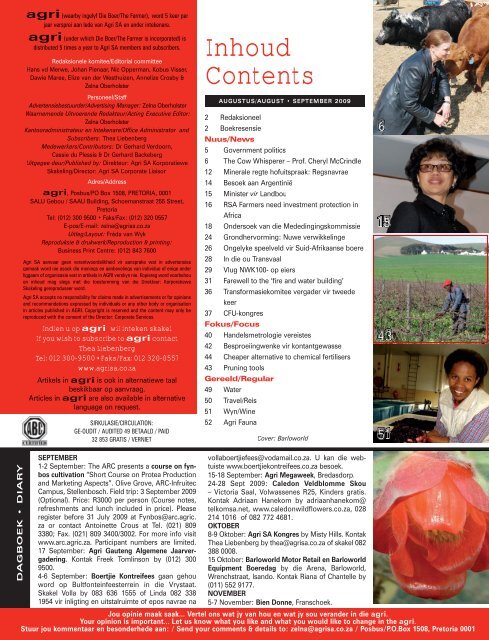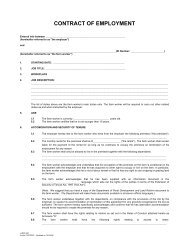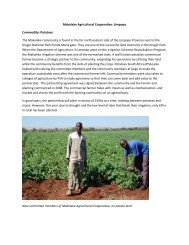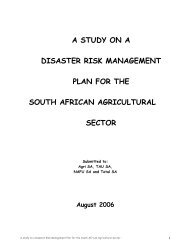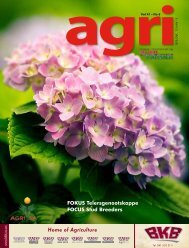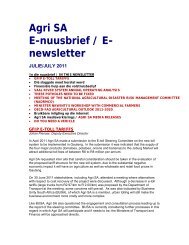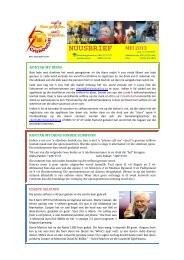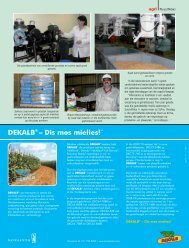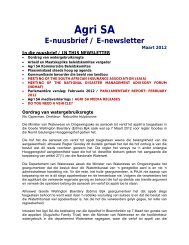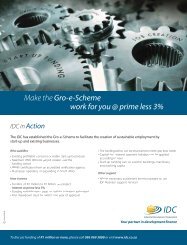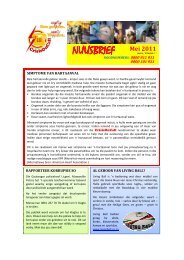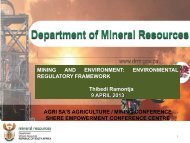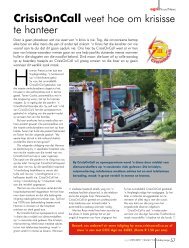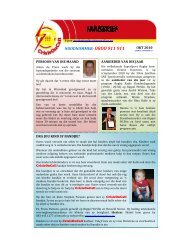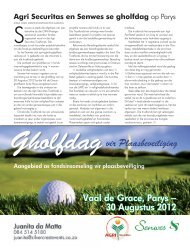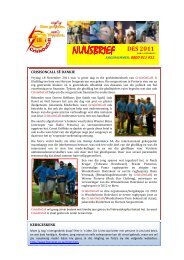Agri AUG SEPT 09.indd - Agri SA
Agri AUG SEPT 09.indd - Agri SA
Agri AUG SEPT 09.indd - Agri SA
Create successful ePaper yourself
Turn your PDF publications into a flip-book with our unique Google optimized e-Paper software.
DAGBOEK • DIARY<br />
agri (waarby ingelyf Die Boer/The Farmer), word 5 keer per<br />
jaar versprei aan lede van <strong>Agri</strong> <strong>SA</strong> en ander intekenare.<br />
agri (under which Die Boer/The Farmer is incorporated) is<br />
distributed 5 times a year to <strong>Agri</strong> <strong>SA</strong> members and subscribers.<br />
Redaksionele komitee/Editorial committee<br />
Hans vd Merwe, Johan Pienaar, Nic Opperman, Kobus Visser,<br />
Dawie Maree, Elize van der Westhuizen, Annelize Crosby &<br />
Zelna Oberholster<br />
Personeel/Staff<br />
Advertensiebestuurder/Advertising Manager: Zelna Oberholster<br />
Waarnemende Uitvoerende Redakteur/Acting Executive Editor:<br />
Zelna Oberholster<br />
Kantooradministrateur en Intekenare/Office Administrator and<br />
Subscribers: Thea Liebenberg<br />
Medewerkers/Contributors: Dr Gerhard Verdoorn,<br />
Cassie du Plessis & Dr Gerhard Backeberg<br />
Uitgegee deur/Published by: Direkteur: <strong>Agri</strong> <strong>SA</strong> Korporatiewe<br />
Skakeling/Director: <strong>Agri</strong> <strong>SA</strong> Corporate Liaison<br />
Adres/Address<br />
agri, Posbus/PO Box 1508, PRETORIA, 0001<br />
<strong>SA</strong>LU Gebou / <strong>SA</strong>AU Building, Schoemanstraat 255 Street,<br />
Pretoria<br />
Tel: (012) 300 9500 • Faks/Fax: (012) 320 0557<br />
E-pos/E-mail: zelna@agrisa.co.za<br />
Uitleg/Layout: Fréda van Wyk<br />
Reproduksie & drukwerk/Reproduction & printing:<br />
Business Print Centre: (012) 843 7600<br />
<strong>Agri</strong> <strong>SA</strong> aanvaar geen verantwoordelikheid vir aansprake wat in advertensies<br />
gemaak word nie asook die menings en aanbevelings van individue of enige ander<br />
liggaam of organisasie wat in artikels in AGRI verskyn nie. Kopiereg word voorbehou<br />
en inhoud mag slegs met die toestemming van die Direkteur: Korporatiewe<br />
Skakeling gereproduseer word.<br />
<strong>Agri</strong> <strong>SA</strong> accepts no responsibility for claims made in advertisements or for opinions<br />
and recommendations expressed by individuals or any other body or organisation<br />
in articles published in AGRI. Copyright is reserved and the content may only be<br />
reproduced with the consent of the Director: Corporate Services.<br />
Indien u op agri wil inteken skakel<br />
If you wish to subscribe to agri contact<br />
Thea Liebenberg<br />
Tel: 012 300-9500 • Faks/Fax: 012 320-0557<br />
www.agrisa.co.za<br />
Artikels in agri is ook in alternatiewe taal<br />
beskikbaar op aanvraag.<br />
Articles in agri are also available in alternative<br />
language on request.<br />
SIRKULASIE/CIRCULATION:<br />
GE-OUDIT / AUDITED 49 BETAALD / PAID<br />
32 853 GRATIS / VERNIET<br />
<strong>SEPT</strong>EMBER<br />
1-2 September: The ARC presents a course on fynbos<br />
cultivation “Short Course on Protea Production<br />
and Marketing Aspects”. Olive Grove, ARC-Infruitec<br />
Campus, Stellenbosch. Field trip: 3 September 2009<br />
(Optional). Price: R3000 per person (Course notes,<br />
refreshments and lunch included in price). Please<br />
register before 31 July 2009 at Fynbos@arc.agric.<br />
za or contact Antoinette Crous at Tel. (021) 809<br />
3380; Fax. (021) 809 3400/3002. For more info visit<br />
www.arc.agric.za. Participant numbers are limited.<br />
17 September: <strong>Agri</strong> Gauteng Algemene Jaar verga<br />
dering. Kontak Freek Tomlinson by (012) 300<br />
9500.<br />
4-6 September: Boertjie Kontreifees gaan gehou<br />
word op Bultfonteinfeesterrein in die Vrystaat.<br />
Skakel Volla by 083 636 1555 of Linda 082 338<br />
1954 vir inligting en uitstalruimte of epos navrae na<br />
Inhoud<br />
Contents<br />
<strong>AUG</strong>USTUS/<strong>AUG</strong>UST • <strong>SEPT</strong>EMBER 2009<br />
2 Redaksioneel<br />
2 Boekresensie<br />
Nuus/News<br />
5 Government politics<br />
6 The Cow Whisperer – Prof. Cheryl McCrindle<br />
12 Minerale regte hofuitspraak: Regsnavrae<br />
14 Besoek aan Argentinië<br />
15 Minister vir r Landbou<br />
16 R<strong>SA</strong> Farmers need investment protection in<br />
Africa<br />
18 Ondersoek van die Mededingingskommissie<br />
24 Grondhervorming: Nuwe verwikkelinge<br />
26 Ongelyke speelveld vir Suid-Afrikaanse boere<br />
28 In die ou Transvaal<br />
29 Vlug NWK100- op eiers<br />
31 Farewell to the ‘fire and water building’<br />
36 Transformasiekomitee vergader vir tweede<br />
keer<br />
37 CFU-kongres<br />
Fokus/Focus<br />
40 Handelsmetrologie vereistes<br />
42 Besproeiingwenke vir kontantgewasse<br />
44 Cheaper alternative to chemical fertilisers<br />
43 Pruning tools<br />
Gereeld/Regular<br />
49 Water<br />
50 Travel/Reis<br />
51 Wyn/Wine<br />
52 <strong>Agri</strong> Fauna<br />
Cover: Barloworld<br />
vollaboertjiefees@vodamail.co.za. U kan die webtuiste<br />
www.boertjiekontreifees.co.za besoek.<br />
15-18 September: <strong>Agri</strong> Megaweek, Bredasdorp.<br />
24-28 Sept 2009: Caledon Veldblomme Skou<br />
– Victoria Saal, Volwassenes R25, Kinders gratis.<br />
Kon tak Adriaan Hanekom by adriaanhanekom@<br />
telkomsa.net, www.caledonwildflowers.co.za, 028<br />
214 1016 of 082 772 4681.<br />
OKTOBER<br />
8-9 Oktober: <strong>Agri</strong> <strong>SA</strong> Kongres by Misty Hills. Kon tak<br />
Thea Liebenberg by thea@agrisa.co.za of skakel 082<br />
388 0008.<br />
15 Oktober: Barloworld Motor Retail en Barloworld<br />
Equipment Boeredag by die Arena, Barloworld,<br />
Wrenchstraat, Isando. Kontak Riana of Chantelle by<br />
(011) 552 9177.<br />
NOVEMBER<br />
5-7 November: Bien Donne, Franschoek.<br />
Jou opinie maak saak... Vertel ons wat jy van hou en wat jy sou verander in die agri.<br />
Your opinion is important... Let us know what you like and what you would like to change in the agri.<br />
Stuur jou kommentaar en besonderhede aan: / Send your comments & details to: zelna@agrisa.co.za / Posbus/P.O.Box 1508, Pretoria 0001<br />
6<br />
15<br />
43<br />
51
agri<br />
Viewpoint<br />
The ruling ANC has identified agricultural and rural development as one of its priorities for the<br />
next few years. Its earnestness in this regard is underscored by the two ministries that have<br />
been created to focus on the commercial functions of agriculture, forestry and fisheries, which<br />
are closely related to those of rural development and land reform.<br />
Government politics<br />
For a long time the joint administration of these two policy<br />
directives within one ministry had meant that commercial<br />
functions of the industry were neglected in favour of<br />
social upliftment objectives of transformation. The result<br />
was the gradual decline of agriculture’s competitiveness and a<br />
decrease in investment, which in 2008 caused South Africa to<br />
lose its status as stable net exporter of food.<br />
It appears that food security, food exports and a more favourable<br />
investment climate for agriculture now represent a government<br />
priority. In a watershed speech before <strong>Agri</strong> <strong>SA</strong>’s General Council<br />
in July 2009, Ms Tina Joemat-Pettersson repeatedly referred to<br />
her mandate from President Jacob Zuma to forge partnerships<br />
with organised agriculture and to address matters in which<br />
the state is involved, such as import protection, research and<br />
funding, in order to exploit “all modern and relevant ways to<br />
develop the production sector”.<br />
Minister Gugile Nkwinti has also assured <strong>Agri</strong> <strong>SA</strong> that rural<br />
development and land reform would be managed within a<br />
strategic framework which would require his department to<br />
work far more closely with organised agriculture at various<br />
levels than was the case in the past. This attitude was given<br />
substance by offering <strong>Agri</strong> <strong>SA</strong> the opportunity to participate in<br />
the parliamentary Portfolio Committee on Rural Development<br />
and Land Reform’s strategic planning session.<br />
There can be no doubt that a new page had been opened for<br />
agriculture and rural development at government level. There<br />
can also be no doubt that government continues to strive for<br />
transformation objectives as set out in the ANC Polokwane<br />
congress resolu tions. The urgency to make progress in this<br />
regard has in fact inten sified. However, various troublesome<br />
policy issues must still be addressed, which will be no easy<br />
task. Aspects such as abandoning the “willing buyer, willing<br />
seller” approach, strengthening of ESTA legislation to provide<br />
farm workers with greater security of tenure, and the basis of<br />
reallocating resources such as water rights, have not yet been<br />
figured out and addressed. In fact, there is more than enough<br />
reason to be concerned about the potential implications of certain<br />
schools of thought on policy changes relating to ownership and<br />
commercial enterprises.<br />
And yet, aspects such as sustainable and competitive agricultural<br />
production are emerging more prominently and we have an<br />
agriculture minister who is in favour of enhancing commercial<br />
agriculture. This is indeed a welcome development and represents<br />
a new search for balance which has lagged behind for too long.<br />
International perspectives on agriculture<br />
The biennial commodity and policy conference of the International<br />
Federation of <strong>Agri</strong>cultural Producers (IFAP) was held at the end of<br />
July 2009 in Ireland against the backdrop of a worldwide economic<br />
recession which agriculture has been unable to escape. The Irish<br />
Farmer’s Association’s president, Padraig Walshe, pointed out<br />
that prices of agricultural products had declined drastically and<br />
that price instability and the credit crisis were making things<br />
increasingly difficult for farmers. Sound familiar? Mr Walshe<br />
added: “Excessive retail power is a problem in Ireland and<br />
many countries as supermarkets push forever more profit at the<br />
expense of the producers. Milk producers in Ireland receive less<br />
than 20 percent of the retail price of milk, while the processors<br />
receive 35 percent and the retailers 45 percent”. He recognised<br />
the need for a code of practice to regulate the conduct of retail<br />
chain stores. This may also be something to which the South<br />
African Competition Commission could attend.<br />
The conference also gave considerable attention to addressing<br />
price stability of agricultural commodities. South African farmers<br />
are extremely frustrated with such price instability, which makes<br />
planning and especially investment decisions problematic and<br />
even highly risky. South African agriculture could benefit from<br />
heeding international opinion on this issue and evaluating it with<br />
a view to local application. The National <strong>Agri</strong>cultural Marketing<br />
Council should attend to this matter, as should the Department<br />
of <strong>Agri</strong>culture, Forestry and Fisheries which is currently looking<br />
at a new agricultural marketing policy.<br />
The issue of rural development and, more specifically, the<br />
empowerment of women in agriculture, access for smallscale<br />
producers to commercial markets and the alleviation of<br />
poverty, were also discussed in depth. Given the South African<br />
government’s new focus on rural development, these debates<br />
at the IFAP conference make one wonder whether the former<br />
Rural Development Foundation should not be revisited, albeit in<br />
an acceptable format which can mobilise resources to make a<br />
meaningful difference to the needs and challenges of our rural<br />
to page 8
Net wat jy nodig het<br />
LandMark-winkel het net wat<br />
jy nodig het vir jou boerdery.<br />
Hierdie moderne<br />
landbouwinkels se<br />
rakke kreun behoorlik<br />
onder die wydste reekse<br />
landbouprodukte, hardeware<br />
en boubenodigdhede.<br />
Besoek ons ook gerus vir<br />
buitelewe - en huishoudelike<br />
produkte en vra gerus ons<br />
kundiges –<br />
hulle help graag!<br />
agri<br />
Tuinbou<br />
Gereedskap<br />
Verf<br />
Besproeiing<br />
Buitelewe<br />
Bou<br />
Landbou<br />
www.landmarkretail.co.za<br />
STANDPUNT van bladsy 4<br />
beskerm. Lewensbydraerfondse van affiliasies – waarop <strong>Agri</strong><br />
<strong>SA</strong> rente aan affiliasies betaal het en later onttrek is – asook<br />
bankfinansiering is opgeneem om die projek deur te voer.<br />
Mettertyd het die gebou se huurinkomste ‘n betekenisvolle<br />
bydrae to <strong>Agri</strong> <strong>SA</strong> se befondsing gelewer, maar die brandskade<br />
aan die gebou in 1994 het die organisasie finansieël geknou. Die<br />
hantering van skuld wat aangegaan moes word om die gebou te<br />
herstel het saamgeval met ‘n gewysigde finansieringsmeganisme<br />
vir die organisasie en het die rasionalisering van <strong>Agri</strong> <strong>SA</strong> se<br />
uitgawe profiel vereis. Desondanks het <strong>Agri</strong> <strong>SA</strong> daarin geslaag<br />
om sy dienste op ‘n aanvaarbare vlak voort te sit en skuld te<br />
delg.<br />
Dit is egter nie in <strong>Agri</strong> <strong>SA</strong> se belang om sy hoofbelegging in een<br />
gebou opgesluit te hou en heelwat tyd van bestuur aan gebou af<br />
te staan nie. Daarom was daar ‘n mandaat verkry om die gebou te<br />
verkoop indien dit teen ‘n aanvaarbare prys verhandel kan word.<br />
<strong>Agri</strong> <strong>SA</strong> was in die gelukkige posisie om ‘n goeie sakebesluit<br />
te neem om te verkoop en is tevrede dat aan die grondleggers<br />
van die gebou se verwagtinge voldoen is om die organisasie se<br />
bates op die wyse te beskerm en laat toeneem. <strong>Agri</strong> <strong>SA</strong> verhuis<br />
in September na Centurion en ons vertrou dat dié skuif sal bydra<br />
tot die organisasie se strewe na funksionele uitnemendheid. a<br />
Hans van der Merwe, Uitvoerende Direkteur<br />
VIEW POINT from page 4<br />
areas. There are various projects underway in agriculture where<br />
individuals or groups have already achieved much to break<br />
the spiral of poverty and illiteracy and to offer communities an<br />
opportunity for development and participation in the formal<br />
economy. These examples could find much wider application<br />
within a structured dispensation and could make a significant<br />
difference in the lives of many people.<br />
AGRI <strong>SA</strong> relocates<br />
The <strong>SA</strong>LU/<strong>SA</strong>AU building has been a landmark within the Pretoria<br />
central business district for the past 40 years. It was originally<br />
erected to protect the South African <strong>Agri</strong>cultural Union’s modest<br />
assets against inflation. Life contributor funds of affiliates - on<br />
which <strong>Agri</strong> <strong>SA</strong> paid interest to affiliates and which were later<br />
withdrawn – as well as bank financing were used to implement<br />
the project. In due course rental income from the building<br />
made a significant contribution to <strong>Agri</strong> <strong>SA</strong>’s funding but the fire<br />
damage in 1994 plunged the organisation into financial difficulty.<br />
Repayment of the debt that had to be incurred to restore the<br />
building coincided with an amended funding mechanism for the<br />
organisation, requiring rationalisation of <strong>Agri</strong> <strong>SA</strong>’s expenditure<br />
profile. <strong>Agri</strong> <strong>SA</strong> nevertheless succeeded in continuing its service<br />
delivery at an acceptable level and to repay its debt.<br />
However, it was not in <strong>Agri</strong> <strong>SA</strong>’s interest to keep its principal<br />
investment tied up in one building and to spend considerable<br />
executive time on managing the building. For this reason, a<br />
mandate was secured a long time ago to sell the building should<br />
an acceptable offer be received. <strong>Agri</strong> <strong>SA</strong> was in the fortunate<br />
position to make a balanced decision to sell and is satisfied that<br />
the expectations of the founders of the building have been met,<br />
namely to protect and grow the organisation’s assets. <strong>Agri</strong> <strong>SA</strong><br />
will be relocating to Centurion in September and we hope that<br />
this move will contribute to the organisation’s efforts towards<br />
functional excellence. a<br />
Hans van der Merwe, Executive Director<br />
8
agri Profile<br />
The Cow Whisperer<br />
Professor Cheryl McCrindle, a lady farmer who understands and ‘fixes’ animals, met with us<br />
at the Onderstepoort Campus of the University of Pretoria.<br />
This academic is a part time far<br />
who, when she retires in 2011 ho<br />
to pursue full time farming with<br />
Bonsmara and Horse Stud.<br />
She is a full Professor in the Section Veterina<br />
Public Health of the Department of Paraclinic<br />
Sciences, at the Faculty of Veterinary science o<br />
the University of Pretoria, a veterinarian with<br />
BVSc(Hons) in bacteriology and a doctorate i<br />
Veterinary Ethology ( Animal Behavior).<br />
Cheryl was born and raised in Johannesburg<br />
and completed her schooling at Roosevelt<br />
High School. Her love for farming originated<br />
from visits to family members on a farm near<br />
Rustenburg. Even at the age of three years<br />
old she knew that she wanted to become a<br />
veterinarian. By high school she also wanted<br />
to farm, possibly because of her memories<br />
of the smell and the sight of longhorned<br />
Afrikander cattle in the early<br />
dawn on her “oom Danie and Tannie<br />
Bessie’s” farm, where she helped bake<br />
bread in the old coal stove early every<br />
morning and collected newly laid eggs<br />
from the fowls.<br />
Her husband Robert, who is also an<br />
academic, is the cousin of one of her<br />
best friends, and he accompanied her<br />
to her matric dance. They got married<br />
in 1969 and have three children, Jamie,<br />
Alec and Sarah Jane. Only Sarah Jane<br />
is inclined towards farming, both her<br />
sons are in the information technology<br />
field and prefer to work in an office.<br />
agri Augustus/August • September 2009<br />
Farmer’s day at Bethany. She regularly teaches Animal<br />
Health to upcoming farmers.<br />
Photo: Professor Cheryl McCrindle<br />
6<br />
n 1972 she bought her own piece of land<br />
after qualifying in 1969 as a veterinarian.<br />
The road from there is somewhat familiar to<br />
many upcoming farmers today. She and Rob<br />
lived in a caravan, whilst farming part-time<br />
with 1 horse, 2 jersey cows, 5 sows and one<br />
boar. The piglets were raised on concentrate<br />
and sold, whilst the breeding pigs were<br />
upplemented with leftovers from the kitchen,<br />
egetables from the garden and perished<br />
aches. She also sold home pasteurised<br />
d churned butter and fresh cream, as well<br />
eaches and straw berries in season. Finally<br />
6, she and her husband, Rob, managed to<br />
p enough money and energy to build their<br />
house, but still continued to farm without<br />
r. He fixed the water pump and tractor, while<br />
ilked the cows and mucked out the stables<br />
herself. All this was part-time as both<br />
worked in order to get enough funds<br />
to build up the farm.<br />
In 1980 she bought 120 ha of farming<br />
land and purchased her first Bonsmara<br />
bull at an auction with the help of<br />
the local farmer’s association, today<br />
known as <strong>Agri</strong> Gauteng. She farms<br />
mainly with Bonsmara cattle and<br />
owns an Arabian and Quarter Horse<br />
Stud. The horses are mainly used for<br />
Western Riding, rounding up cattle on<br />
the farm and showing. Her interest<br />
lies particularly in training horse to<br />
work cattle quietly and efficiently.
Photo: Professor Cheryl McCrindle<br />
Photo: Professor Cheryl McCrindle<br />
Cheryl on her Arabian mare<br />
Ilizwe My Flair- Western Riding<br />
Association Champion at Horse<br />
of the Year in 2009.<br />
Sarah Jane McCrindle, her<br />
daughter, riding her Quarter<br />
Horse stallion, Bronco<br />
Captain Cape, at the Horse<br />
of the Year in 2008.<br />
“It is extremely difficult<br />
for anyone who doesn’t<br />
inherit a farm to get into<br />
farming. The paperwork<br />
that various legislation<br />
brings in terms of water rights,<br />
labour, funding and the like, is<br />
especially daunting.”<br />
Cheryl claims that 60% of<br />
farming time is wasted on paperwork,<br />
which could have been<br />
utilised on farming. In 1990 she<br />
joined the Medical University of<br />
South Africa as a production<br />
animal veterinarian and spent<br />
the next 10 years working with<br />
small scale farmers to improve<br />
the health of their animals. Due<br />
to her work with upcoming<br />
farmers, she believes that<br />
communal farming has a higher<br />
potential profit margin, in fact<br />
possibly even ten times more<br />
than commercial farming, over<br />
a period of time. The input costs<br />
versus the outputs achieved are<br />
more profitable when farming<br />
on communal land with no land<br />
taxes and using family labour. One of her aims is to improve the<br />
productivity and fertility of livestock owned by upcoming farmers<br />
so that they can truly realise the financial benefits.<br />
It is her conviction that there are large areas available in the<br />
previous homelands, which could be leased from either the chiefs<br />
or the local municipalities, and that these lands are suitable for<br />
agriculture.<br />
7<br />
“I work to be able afford to farm. My biggest frustration as a part<br />
time farmer is that I cannot expand my farm because I do not<br />
have the time. Cattle prices remain stagnant whilst my input costs<br />
keep rising. I am only able to cover these expenses because I<br />
have an alternative source of income”, she says.<br />
In 2006 she was awarded the Shoprite–Checkers /<strong>SA</strong>BC2 Woman<br />
of the Year Award in the Education Category. This she received for<br />
‘creating a new paradigm of thought and action in the veterinary<br />
field, especially for her contribution to uplifting people of previous<br />
disadvantaged communities in meaningful and productive ways<br />
through teaching animal health and welfare’.<br />
The award was mainly given to her because she developed web<br />
based training courses to teach veterinarians, extension officers<br />
and animal health technicians from Africa how to communicate<br />
with and train small-scale farmers. There are still twenty to forty<br />
participants who enrol for this module every year.<br />
She believes that organised agriculture’s contribution to agriculture<br />
is enormous and is currently a member of <strong>Agri</strong> Pretoria,<br />
Gauteng.<br />
“Not only is there a kindred spirit present at the meetings, but<br />
<strong>Agri</strong> <strong>SA</strong> as a whole has done much to change the perceptions<br />
of the nation. ‘Boer’ is less of a swear word because of their<br />
efforts. The common language of the farmer is understood by<br />
any culture, race or nationality.”<br />
She also has appreciation for the bargaining done on behalf of<br />
farmers. and is saddened by the lack of praise for farmers in the<br />
media, as she believes it doesn’t contribute to motivating new<br />
entrants. She says we should not follow the example of Britain,<br />
where legislation now hampers farming to such an extent that<br />
they have destroyed family farms and farming is now done by<br />
large syndicates without the passion for farming, as they are only<br />
interested in the bottom line.<br />
Her advice to young farmers is to follow their dreams and to be<br />
prepared to work hard. She believes it is possible to make a living<br />
of farming and points out that there are many vacant positions as<br />
farm managers.<br />
“Start small. Be creative. Don’t give up. If you have access to<br />
communal farming, make use of it.”<br />
Cheryl believes that there will always be a future for farmers as<br />
people will always need food. However,<br />
the frustration of continually changing goal<br />
posts with new regulations and forms to fill<br />
in, as well as the low profit margins, makes<br />
the farmers’ life difficult .<br />
“The weak Rand should be used as an<br />
export advantage, but that fact also makes<br />
it difficult to keep up with international<br />
prices on input costs.”<br />
“We need to be able to export and break<br />
down trade barriers. South African agriculture<br />
is on par with world standards.<br />
farming is a business that will need the<br />
back up from private enterprise as there is<br />
simply not enough money available from<br />
state subsidies.”<br />
In her free time she participates in Western<br />
Riding Championships at major shows<br />
and loves to spend time near animals,<br />
especially horses and cows. a<br />
Volume 38 No 4<br />
ZELNA OBERHOLSTER
agri<br />
agri<br />
Nuus / News<br />
Die doel van dié Memorandum soos opgestel deur Marietjie Jacobs van MacRobert Inc is om verslag<br />
te doen na die konsultasie met Adv Gerrit Grobler SC en Adv Jannet Gildenhuys op 6 Mei 2009. Beide<br />
advokate is gevra om sekere regsvrae wat ontstaan het na aanleiding van die uitspraak van Regter<br />
Hartzenberg dat die Mineraal- en Petroleum Hulpbronne Ontwikkelingswet, Wet 28 van 2002 (“die<br />
Wet”) inderdaad onteiening van mineraalregte tot gevolg gehad het.<br />
Regsvrae na aanleiding van die<br />
mineraleregte hofuitspraak<br />
Die volgende spesifieke aspekte is be -<br />
spreek:<br />
VRAAG 1:<br />
In terme van regulasie 82A het ‘n eiser<br />
een jaar nadat hy bewus geword het of<br />
rederlikerwys moes bewus gewees het<br />
van die onteiening om die eis in te dien.<br />
Die vraag is wat eienaar van grond en/<br />
of mineraalreghouer moet doen om<br />
rederlikerwys bewus te wees van die aard<br />
en omvang van die mineraalregte ten einde<br />
die eis in te dien?<br />
ANTWOORD:<br />
Adv Grobler SC bevestig dat die reg op<br />
minerale onteien is en dat ‘n eis ingestuur<br />
moet word vir onteiening van die eiendomsreg.<br />
Alle eise moet dus voor April 2011<br />
ingedien word. Indien ‘n eis ingedien is<br />
waarin ‘n persoon byvoorbeeld slegs vir<br />
vergoeding geëis het vir die verlies aan<br />
steenkoolregte, besluit die hof oor die<br />
kwantum in die betrokke verhoor van die<br />
saak oor die steenkool. Indien dit egter na<br />
die indiening van die eis, maar voor die<br />
verhoor blyk dat ander mineraalregte ook<br />
ekonomiese waarde het, sal dit slegs die<br />
kwantum van die eis beïnvloed wanneer die<br />
saak in die Hooggeregshof beslis word. So<br />
‘n persoon sal slegs geleentheid hê om een<br />
maal te eis en die eis behels die ontneming<br />
van die reg op minerale in sy grond op<br />
sterkte van onteiening wat deur die Wet<br />
tot stand gekom het. As die verhoor egter<br />
afgehandel is en dit blyk later dat ander<br />
minerale ook verloor is, (byvoorbeeld, die<br />
aanvanklike eis was vir steenkool en nou<br />
blyk dit daar is ook diamante op die grond<br />
waarvoor nie geeis is nie) kan ‘n persoon<br />
nie weer ‘n eis indien. ‘n Persoon het nie die<br />
reg om meer male ‘n eis in te dien indien<br />
hy bewus word van verdere ekonomies<br />
ontginbare minerale en dat die kwantum<br />
van sy eis inderdaad groter behoort te<br />
gewees het nie.<br />
VRAAG 2:<br />
‘n Vraag wat op die voornoemde volg is<br />
of ‘n persoon wat wel ‘n eis vir onteiening<br />
ingedien het vir sy verlies aan regte in<br />
sekere minerale later uitvind dat daar ook<br />
Augustus/August • September 2009<br />
ander ontwikkelbare minerale op die grond<br />
is, daarna weer ‘n eis kan indien of moes<br />
hy rederlikerwys ten tye van die eerste eis<br />
ge-eis het vir beide?<br />
ANTWOORD:<br />
Die normale gemeenregtelike beginsels<br />
en die feite van elke geval sal bepaal<br />
wat van ‘n persoon verwag kan word om<br />
redelikerwys bewus te gewees het dat sy<br />
mineraalregte onteien is. Dit is slegs in<br />
hoogs uitsonderlike gevalle wat ‘n persoon<br />
daarop sou kon steun dat hy nie bewus was<br />
dat hy ‘n eis moes indien nie. Adv Grobler<br />
SC is van mening dat weens die wye<br />
publisiteit wat die aangeleentheid reeds<br />
in die pers gehad het, ‘n persoon ‘n baie<br />
skraal kans het om ‘n verweer te opper dat<br />
hy nie voor April 2011 se eis ingedien het<br />
nie, aangesien hy nie bewus was dat hy<br />
sodanige eis kon indien nie. Die bepaling<br />
wat in regulasie 82A vervat is wat verwys<br />
na persone wat redelikerwys bewus geword<br />
het van die verlies van die mineraalregte na<br />
April 2011 sal uitsonderlike gevalle wees<br />
waar ‘n persoon byvoorbeeld nie geweet<br />
het dat hy die houer van mineraalregte<br />
was op 1 Mei 2004 toe die Wet in werking<br />
getree het nie. Sy advies is dus dat ons<br />
die bestaande kliënte asook alle belange<br />
groepe van <strong>Agri</strong> <strong>SA</strong> moet adviseer om wel<br />
so spoedig moontlik eise in te dien.<br />
VRAAG 3:<br />
Het die feit dat die hof nou bepaal het dat die<br />
wet onteiening daarstel, die bepalings van<br />
die onteieningswet daarop van toepassing<br />
gemaak? Indien wel, wat is die wisselwerking<br />
van die twee wette? M.a.w. die normale<br />
onteiening van grond het tot gevolg dat die<br />
staat nie okkupasie kan neem tensy 80%<br />
van die onteieningsvergoeding betaal is<br />
nie. In die huidige mineraalreg gevalle ken<br />
die staat prospekteer lisensies en in effek<br />
okkupasie aan derde partye toe sonder om<br />
enige vergoeding te betaal. Verder maak<br />
die staat normaalweg aanvanklik ‘n aanbod<br />
saam met die onteieningskennisgewing en<br />
doen dit op sterkte van ‘n waardasieverslag<br />
van ‘n waardeerder. In terme van Wet 28<br />
van 2002 rus die onus op die eienaar om<br />
die vergoeding teen hoë koste te bewys.<br />
12<br />
ANTWOORD:<br />
Wat die wisselwerking tussen die onteieningswet<br />
en die mineraalregwet<br />
aanbetref is die advies dat die spesifieke<br />
bepalings verwys na in regulasie 82A van<br />
die mineralewet eers ter sprake kom nadat<br />
die staat erken het dat ‘n eis bestaan en die<br />
partye nou onderhandel en ooreen moet<br />
kom oor die vergoeding betaalbaar. In wese<br />
is die artikel 9 onteieningswetsprosedure<br />
in die onteieningswet in die mineralewet<br />
ingeskryf by wyse van regulasie 82A. Die<br />
feit dat die betrokke regulasie verwys na<br />
artikel 14 van die onteieningswet is nie<br />
wesenlik nie, aangesien, in die <strong>Agri</strong> <strong>SA</strong><br />
geval, reeds dagvaarding uitgereik is omdat<br />
die Staat nie die onteiening wil erken nie en<br />
derhalwe nie ingestem het om ‘n spesifieke<br />
bedrag vergoeding te bepaal nie. Dit is<br />
dus nie korrek om ‘n afleiding te maak dat<br />
die Staat eers ‘n onteieningshandeling<br />
moet pleeg en terselfdetyd 80% van die<br />
vergoeding aanbied nie. Normaalweg<br />
kan die staat ‘n onteieningskennisgewing<br />
in terme van die onteieningswet uitreik<br />
sonder om vergoeding aan te bied, waarna<br />
die bepalings van die onteieningswet soos<br />
verwys na in regulasie 82A ter sprake kom.<br />
Die twee wette is dus nie in konflik met<br />
mekaar nie. Die prosedurele aspekte van die<br />
onteieningswet is in die mineralewet vervat<br />
om die onderhandeling en vasstelling van<br />
die vergoeding te bepaal nadat die staat<br />
wel erken het dat onteiening bestaan.<br />
VRAAG 4:<br />
Waar lê die eis vir die ontneming/onteiening<br />
van die bogrond nadat die mineraalregte<br />
aan ‘n derde party toegeken is? In meeste<br />
gevalle kan die grond nie weer vir boerdery<br />
doeleindes gebruik word nie. Wanneer en<br />
teen wie word die eis ingestel?<br />
ANTWOORD:<br />
Wat die onteiening of ontneming van bogrond<br />
weens mynbedrywighede op plaasgrond<br />
aanbetref, is die advies dat alhoewel<br />
artikel 54 van die mineralewet voorsiening<br />
maak vir die eienaar van bogrond om<br />
skadevergoeding van die mynmaatskappy<br />
te eis, sou ‘n beter benadering wees om<br />
eerder ‘n eis op sterkte van onteiening in<br />
na bladsy 17
agri<br />
Nuus / News<br />
REGSVRAE NA AANLEIDING VAN DIE MINERALEREGTE HOFUITSPRAAK K van bladsy 12<br />
terme van item 12 van die minerale wet<br />
by die Direkteur Generaal van Myne in te<br />
dien. Die advies is dat ‘n wyer benadering<br />
en begrip by onteieningsvergoeding ter<br />
sprake is as bloot skadevergoeding soos<br />
voorsien in artikel 54 van die mineralewet.<br />
Skadevergoeding is slegs een komponent<br />
van onteieningsvergoeding en het howe<br />
wêreldwyd die beginsel van werklike verlies<br />
wat tranegeld insluit bevestig. In dien<br />
die grondeienaar en mineraalreghouer dieselfde<br />
persoon of entiteit is kan die twee<br />
eise gelyktydig ingedien word of slegs<br />
later vir die verlies aan bogrond geeis<br />
word as die verlies eers later plaasvind.<br />
VRAAG 5:<br />
Is daar enige vooruitsigte van gesprekke<br />
met die staat om die groter belange van<br />
partye uit te klaar?<br />
ANTWOORD:<br />
Adv Grobler SC het ook bevestig dat<br />
artikel 25(3) van die grondwet nie enige<br />
beperking plaas op die betaling van billike<br />
vergoeding nie. Aangesien die grondwet<br />
juis voorsiening maak vir die betaling van<br />
billike vergoeding beteken dit dat enige<br />
beperking op onteieningsvergoeding in<br />
enige wet in watter formaat ookal on grondwetlik<br />
sal wees en billike ver goeding alles<br />
omvattend is.<br />
VRAAG 6:<br />
Wat is die standpunt van die mynhuise in<br />
die lig van die uitspraak? Oorweeg van<br />
die mynhuise om ook eise in te dien?<br />
Het Trevor Manuel wel die versekering<br />
van die eertydse minister van minerale en<br />
energie gekry dat die wetgewing nie tot<br />
grootskaalse eise aanleiding sal gee nie?<br />
ANTWOORD:<br />
Verskeie myne het reeds eise ingedien<br />
vir vergoeding en is die advies weereens<br />
dat ons voortgaan om mineraalreghouers<br />
te adviseer dat hul die nodige eise moet<br />
indien.<br />
VRAAG 7:<br />
Is dit die advies dat ons nou die kliënt<br />
behoort te adviseer om wel die onkostes<br />
aan te gaan om eise in te dien in die lig van<br />
die verloop wat die saak nog gaan neem?<br />
ANTWOORD:<br />
Wat die bewyslas op die mineraalreghouer<br />
aanbetref is die advies dat met die indien<br />
van die aanvanklike eis, die mineraalreghouer<br />
soveel inligting as moontlik moet<br />
voorsien, maar dat dit nie op die indien van<br />
die eis stadium nodig is om gedetaileerde<br />
waardasies en/of geologiese verslae<br />
in te dien nie. Dié aspekte kan in meer<br />
be sonderhede hanteer word indien die eis<br />
afgewys word en die mineraalreghouer<br />
dagvaarding in terme van regulasie 82A van<br />
die Wet moet uitreik. Die mineraalreghouer<br />
sal ten minste moet bewys kan lewer van<br />
wat die markwaarde van die minerale<br />
was ten tye van onteiening synde, 1 Mei<br />
2004. Twee klasse van waardasies kom<br />
ter sprake. Indien die mineraalregte in die<br />
verlede hoofsaaklik ‘n rol gespeel het of ‘n<br />
persoon ‘n hoër aanbod vir sy grond sou<br />
ontvang het, is die aangewese persoon om<br />
te gebruik ‘n waardeerder om te bepaal<br />
wat die markwaarde van die mineraalregte<br />
was. Die tweede kategorie is die grond<br />
waar prospektering wel reeds plaasgevind<br />
het. In so ‘n geval is die klassifikasie van<br />
die mineraal belangrik en moet ‘n geoloog<br />
‘n verslag aan die mineraalreghouer lewer.<br />
Dit is egter nie op dié stadium nodig dat<br />
enige van die verslae by die Direkteur<br />
Generaal van Myne by die indien van die<br />
eis ingedien word nie. ‘n Skatting van<br />
die markwaarde van die mineraalreg wat<br />
onteien is, is voldoende op die stadium en<br />
kan die verslae dien om die presiese berdag<br />
van die eis en omvang daarvan beter te<br />
bepaal op verhoor van die saak voor die<br />
hof. a<br />
Nic Opperman, Direkteur: Natuurlike<br />
Hulpbronne
ARTIKEL: ZELNA OBERHOLSTER<br />
agri Nuus / News<br />
In die ou Transvaal…<br />
2009 – die eeufeesjaar van verskeie korporasies. NWK,<br />
NTK, Suidwes en Senwes is die ko-öperasies van die<br />
Noordelike provinsies wat in 1909 ontstaan het.<br />
Hoekom juis in 1909? Dr JAS van Niekerk het reeds in<br />
1986 onder andere navorsing hieroor bekend gemaak<br />
in sy boek Koöperatiewe Teorie en Praktyk k en in 1994<br />
Koöperatiewe Teorie en Praktyk Addendum 1. Volgens<br />
sy skrywe was daar verskeie insidente wat landbou beiinvloed<br />
het tussen 1870-1910. Die ontdekking van diamante, wat Suider<br />
Afrika aanloklik gemaak het vir buitelanders, die ontdekking van<br />
goud, die spoorweglyne wat veral behulpsaam was met vervoer<br />
van wol en ander landbouprodukte. Laastens was daar die Anglo-<br />
Boereoorlog wat die voormalige republieke onder Britse beheer<br />
geplaas het. Die land moes fisies herbou word nadat die Britse<br />
verskroeide aarde oorlogbeleid die velde swart gebrand het en<br />
daar ernstige mielietekorte was. Landbou en mynbou was gesien<br />
as die die twee sleutelbedrywe wat tot ekonomiese herstel kon<br />
lei. Na die sluiting van die Vrede van Vereeniging in 1902 was die<br />
land in armoede gedompel. Uitkoms was gesoek om markte te<br />
skep vir produsente se produkte. Hiermee saam het metodes om<br />
landbou in die land te bevorder onder bespreking gekom, onder<br />
andere die stigting van koöperasies.<br />
In 1905 het boere die koöperasiegedagte bespreek. Weens verskeie<br />
struikelblokke het die toepassing daarvan verhoed en moes<br />
dit eers op ys gesplaas word. Die Direkteur van Landbou het in<br />
sy 1906/7 Jaarverslag pertinent gesê dat pogings aangewend sal<br />
word om iemand te vind wat die boere kon oplei en inlig oor die<br />
koöperasiewese.<br />
Die Transvaalse regering het op Deense kundigheid staat gemaak<br />
en in November 1907 het Stilling Andersen van Hannon die<br />
leiding gegee met die stigting van Koöperasies. Hy het onder<br />
andere gesamentlike bemarking van produsente se produkte<br />
voorgestaan, maar spoedig besef dat een van die grootste tekortkominge<br />
die gebrek aan ‘n koöperasiewet was, aangesien die<br />
koöperasie nie deur wetgewing beskerm word of op finansiële<br />
ondersteuning sou kon staatmaak daarsonder nie. Teen 30 April<br />
1907 was daar reeds 53 koöperasies wat in wording was.<br />
Daar was wel in 1907 ‘n wet aangeneem deur die Landbank van<br />
Transvaal wat magtiging verleen het om lenings aan koöperasies<br />
te bewerkstellig. Boere het geleidelik besef dat ‘konsolodering<br />
Augustus/August • September 2009<br />
28<br />
van kragte’ die beste manier was om produkte se pryse te verhoog<br />
en te kanaliseer. Dit het die stigting van verskeie landbou<br />
koöperasies tot gevolg gehad, veral nadat ‘n Koöperatiewe<br />
Kongres in 1908 in Pretoria gehou is.<br />
Die eerste Koöperasiewet van Transvaal het op 1 Oktober 1908 in<br />
werking getree, maar wysigings aan hierdie en die Landbankwet<br />
moes eers gemaak word. Ontevredenheid dat 2/3 van die lede ten<br />
gunste van ‘n lening van R200 of meer moes stem en die helfte<br />
as voorskot op produkte moes stem, het gelei na ‘n komitee van<br />
ondersoek wat wysigings moes voorstel.<br />
Hierdie wysigings is voorgelê aan die Tweede Transvaalse<br />
Kongres op 3 en 4 Junie 1909 en het gelei tot die Wysigingswet<br />
wat op 16 Julie 1909 in werking getree het. En dit het gelei tot die<br />
stigting van verskeie koöperasies.<br />
NWK is gestig op 4 Mei 1909, gevolg deur Senwes op 15<br />
Mei 1909. Waterberg Landbouwers’ Koöperatiewe Vereeniging<br />
(van dag brekend as NTK) is op 29 Mei 1909 gestig, nadat 103<br />
boere ooreengekom het tot die stigting daarvan. Die Suidwes<br />
Ko-operasie is gestig op 16 Augustus 1909.<br />
Aan die begin was die koöperasies onbeperk geregistreer en dit<br />
het talle bankrotskappe tot gevolg gehad. Van die probleme was<br />
ontrouheid van lede, gebrek aan kennis by die boere, ongemaklikheid<br />
oor erkende bemarkingsmetodes, gepaardgaande met<br />
problematiese bemarking van landbouprodukte en ‘n gebrek aan<br />
behoorlike wetgewing met betrekking tot die werksaamhede van<br />
die koöperasies.<br />
na bladsy 30<br />
Suidwes se hoofkantoor. Die Suidwes Ko-operasie is gestig op<br />
16 Augustus 1909.<br />
Senwes hoofkantoorgebou was geleë in Corrie de Kockstraat in Klerksdorp<br />
en is amptelik geopen op 12 April 1947. (met vergunning van Senwes). NTK se eerste hoofkantoor.<br />
agri
agri Nuus / News<br />
Rekord-syfers lei nuwe eeu binne<br />
Senwes se eenhonderdste bestaansjaar word vanjaar gevier met die onlangse aankondiging van ‘n rekord-omset en -winssyfer<br />
as deel van die winsgewendste jaar in die geskiedenis van dié agri-besigheid.<br />
As deel van die 100-jaar vieringe het Senwes ook sy stem by die woord gevoeg vir plaasveiligheid. ‘n Gedenklied is in opdrag<br />
van Senwes gekomponeer en die opbrengs van die verkope van die DVD, wat die lied My Land bevat, sal aan die <strong>Agri</strong> Securitas<br />
Trustfonds geskenk word.<br />
Saam met <strong>Agri</strong> <strong>SA</strong> sit Senwes steeds skouer aan die wiel om die primêre landbouer as mededingende, volhoubare en<br />
gewaardeerde rolspeler in voedselsekuriteit te posisioneer en te behou. a<br />
Johan Dique, Besturende Direkteur: Senwes<br />
In die ou Transvaal…<br />
van bladsy 28<br />
In 1939 was voorsiening gemaak vir koöperasies met beperkte<br />
aanspreeklikheid deur die gewysigde Koöperatiewe wet, nadat die<br />
1934 Kommissie bekendgemaak het dat die Kaapse Koöperasies<br />
kragtens die maatskappywet geregistreer is en dat daar nie be -<br />
perkende koöperatiewe wetgewing bestaan het nie. Die ‘rekbare<br />
en los’ stelsel is vervang met een van beperkte aanspreeklikheid.<br />
<strong>Agri</strong> <strong>SA</strong> se fondasies<br />
In Julie 1904, het die Transvaalse Landbou-Unie (TLU) ‘n vergadering<br />
gehou in die Wetgewende Raadsaal om ‘n Interkoloniale Landbou<br />
Unie te bespreek. Sir Arthur Lawley het die verrigtinge ge open.<br />
Die stamboek, die wesenlikheid van ‘n brandsiekwet, die bekamping<br />
van Ooskuskoors, spoorwegtariewe, plantsiekte bestryding, die<br />
bestryding van veldbrande, die onwenslikheid van vleismonopolies<br />
en die voordele van koöperasies is bespreek. Dit het gelei tot die<br />
ontstaan van die Suid-Afrikaanse Landbou Unie (<strong>SA</strong>LU) en die<br />
BusinessPrint’s best wishes to<br />
<strong>Agri</strong> <strong>SA</strong> in your new home<br />
Ons deel jul vreugde oor<br />
die opwindende mylpaal<br />
en groei geleentheid<br />
May you prosper and grow even<br />
more in your new offices!<br />
agri<br />
eerste kongres is in 1905 in Pietermaritzburg gehou.<br />
Die koöperasies het gefokus op sake-aangeleenthede en het<br />
bygedra tot die lewensvatbaarheid van boerdery. Die beleidsfunksies<br />
van die <strong>SA</strong>LU is later geïntegreer met die van koöperasies<br />
deur die Koöperatiewe Raad daar te stel, wat na<br />
die deregulering van die landboubemarking omskep is in ’n<br />
Landboubesigheidskamer (LBK).<br />
Die LBK bedien vandag ’n wye spektrum landboubesighede<br />
en gemeenskaplike beleidsbelange in ’n noue samewerking<br />
verhouding met die <strong>SA</strong>LU se opvolger, <strong>Agri</strong> <strong>SA</strong>.<br />
<strong>Agri</strong> <strong>SA</strong> bevorder vandag steeds die belange van boere op<br />
plaaslike en nasionale vlak. Dit word gedoen deur staatkundige<br />
en politieke grense te oorskry in soeke na geskikte oplossings.<br />
Die leiding wat boere geneem het in 1904 met denke, woord en<br />
daad is vandag steeds kenmerkend van <strong>Agri</strong> <strong>SA</strong>.<br />
<strong>Agri</strong> <strong>SA</strong> wens alle koöperasies en lanboubesighede wat hierdie<br />
jaar hul honderdjaar-bestaan vier, van harte geluk en bedank hul<br />
vir hul ondersteuning deur die jare. a
agri<br />
Nuus / News<br />
Farewell to the ‘fire and water’ building”<br />
<strong>Agri</strong> <strong>SA</strong> is moving from the <strong>SA</strong>AU building at the end of August. The South African <strong>Agri</strong>cultural Union<br />
(<strong>SA</strong>AU) building has been home to <strong>Agri</strong> <strong>SA</strong> for four decades. According to Mr Piet Swart, former CEO of<br />
<strong>Agri</strong> <strong>SA</strong>, discussions to protect the then <strong>SA</strong>AU (South African <strong>Agri</strong>cultural Union), against inflation was<br />
started by the Capelands <strong>Agri</strong>cultural Union, president, Mr Devilliers Laubscher. Today he is remembered<br />
as the ‘father of the thought’. Mr Frans van Wyk, chairman of the Co-operation Board initiated<br />
the idea of erecting a building and got the approval from the Board. The decision was unilateral.<br />
Architects, Harris Fels Jankes Nussbaum were contracted and tenders for engineers, building contractors<br />
etc. were invited. Mr Swart recalls that the total cost to build the <strong>SA</strong>AU building, including air<br />
Aconditioners, lifts etc. was less than R3.5 million. The difference between the money made available<br />
by the farmers and the cost, was loaned against a current account from Volkskas Bank. The major<br />
role players in getting approval for the erection of the building and managing the finances and negotiations<br />
were Frans Van Wyk, Chris Celliers (then CEO) and Jan Mouton. The building was officially opened on 21<br />
October 1970 by the Minister of <strong>Agri</strong>culture, Senator D.C.H Uys.<br />
Initially, only <strong>SA</strong>AU staff occupied the 28th and 29th floors and the rest of the building was rented out.<br />
Criticism was abound about the size of the building as many thought the building to be a white elephant. Talks<br />
to sell the building were entertained,<br />
but it never came to fruition. After the<br />
building was gutted by fire in 1994,<br />
decisions had to be made again about<br />
the viability to fix it up, mothball the top<br />
floors until later or sell it as it were.<br />
Sentrasure, issued a cheque to the<br />
value of R28 million, one of the biggest<br />
insurance payouts until then in the history<br />
of South Africa.<br />
Almost the entire history of <strong>Agri</strong>culture<br />
in South Africa was lost, but working<br />
documents could be savaged. <strong>Agri</strong> <strong>SA</strong><br />
is built on strong foundations, and so<br />
too, the structure of the building, which<br />
had almost no structural damage.<br />
Jack Raath, former Executive Director<br />
of <strong>Agri</strong> <strong>SA</strong>, remembers the shock and<br />
amazement when they realized that the<br />
building was in fact burning. He claims<br />
that there was a small fire in die cellar<br />
the day before the big fire, and when<br />
told that they need to evacuate the<br />
building he was sure it was a waste of<br />
time as the fire could be put out. He<br />
remembers that Mr Piet Swart went<br />
down the stairs to fetch chairs in order<br />
for the staff to climb onto the helicopter<br />
to page 34<br />
The front cover of the <strong>Agri</strong>, July 1984.<br />
Johan Pienaar, seated in what<br />
used to be his chair, in the<br />
remains of the building.<br />
31<br />
The plaques on either side of<br />
the <strong>Agri</strong> <strong>SA</strong> mirror indicates the<br />
original opening of the building<br />
and the new one, after the<br />
restoration done after the fire.<br />
V olume 38 No 4
agri<br />
Farewell to the ‘fire and water’ building”<br />
from page 30<br />
from the roof. The real shock set in when they were allowed to<br />
walk up the stairs to their offices and tried to figure out where<br />
their desks were.<br />
Many other staff who were employed at the time of the fire,<br />
remembers the congeniality, loyalty and support from clients,<br />
partners and strangers. They helped by supplying cell phones<br />
or dropped of boxes with historical documents astounded<br />
them and is part of the fond memories of that day. Total <strong>SA</strong><br />
provided the management of <strong>Agri</strong> <strong>SA</strong> with cell phones in order<br />
to communicate. Staff remember working in the ‘gat’ right at the<br />
bottom of the building, working and trying to salvage historical<br />
documents. Others remember the scary ordeal of taking a leap of<br />
faith from the roof of the building to the helicopter ladders. The<br />
building was re-opened on 15 June 1994.<br />
<strong>Agri</strong> <strong>SA</strong> has now sold the <strong>SA</strong>AU-building at a reasonable price.<br />
Although years of history and fond memories and sentiments<br />
will be remembered, new history will be made on the same<br />
foundations of a strong organisation.<br />
This will thus be our last issue from the 28th floor of one of<br />
Pretoria’s landmark buildings. Now it is time for a new era, and<br />
the offices will be moved to the Inkwazi building in Centurion,<br />
by the end of August. <strong>Agri</strong> <strong>SA</strong> would like to thank all of its past<br />
and present staff, partners and members for helping to achieve<br />
its goals.<br />
The same commitment, loyalty and resolve will take <strong>Agri</strong> <strong>SA</strong> to<br />
new heights. a<br />
34
agri<br />
Fokus / Focus<br />
NEW SOLUTION TO <strong>SA</strong>’S VERMIN PROBLEM<br />
This year, the food industry will have to comply with<br />
HACCP in order to be issued permits to trade. This<br />
means that, with health regulations becoming more<br />
stringent, business owners and farmers must find<br />
ways of solving their vermin problems.<br />
New, electromagnetic technology which has helped<br />
Australia deal effectively with its mice, rat and other pest<br />
problems has been launched in South Africa where rodent<br />
populations are now reaching epidemic proportions.<br />
Plug-In Pest Free has been heralded as the new ‘pied piper in<br />
town’. It eradicates all rats, mice and cockroaches from buildings<br />
and is the most cost-effective way of controlling the problem. The<br />
unit plugs into the wall socket and creates an electro-magnetic<br />
After this it was identified by Mr Ian<br />
Millar, a taxonomist of the National<br />
Insect Collection in Pretoria. The<br />
discovery of the Pomegranate whitefly<br />
(Siphoninus phillyreae) is a further headache<br />
for South African fruit farmers and<br />
gardeners. Recently Prof Giliomee’s<br />
discovery of the exotic Woolly whitefly<br />
(Aleurothixus floccosus), which attacks<br />
citrus, also made the headlines.<br />
Contrary to what their name suggests,<br />
these insects are not flies but are rather<br />
more closely related to scale insects and<br />
aphids. The adults look like tiny moths<br />
and fly around rapidly while at the<br />
younger stages they are suctioned onto<br />
the underside of leaves. According to<br />
Prof Giliomee, these whiteflies have the<br />
potential to become very troublesome and<br />
to do a great deal of damage.<br />
When they arrived in California in 1988,<br />
the whiteflies affected many shrubs and<br />
trees so badly that the plants lost all their<br />
leaves and the harvest of fruit trees was<br />
reduced.<br />
“Young pear trees even died as a result of<br />
repeated exfoliation,” Prof Giliomee says.<br />
“In cities and towns, the sticky honeydew<br />
that is secreted during the sap-sucking<br />
early stages, landed on cars and on people<br />
and was even carried into houses by the<br />
wind to make carpets and furniture sticky<br />
too.<br />
“It was intolerable and the pest was only<br />
brought under control in California when<br />
parasites were imported,” he said.<br />
The Pomegranate whitefly originates in<br />
countries around the Mediterranean Sea<br />
like Spain, Italy, Israel and Egypt where,<br />
apart from garden shrubs, it attacks a<br />
wide range of fruit trees. It later spread<br />
to India, Iran and New Zealand. A great<br />
number of pomegranate cuttings have<br />
been imported into South Africa from<br />
Israel and India in the past few years. Prof<br />
field around the wiring of the premises. Its primary benefit<br />
to the agricultural industry would be to protect storehouses,<br />
barns, warehouses and packing plants from rodents eating the<br />
harvested grain, bailed produce, or seeds and supplements.<br />
The Plug-In Pest Free unit has been passed by both <strong>SA</strong>BS and<br />
HACCP (Hazard Analytical Critical Control Point) and has been<br />
successfully tested in various scientific double blind tests.<br />
The system works in ridding grain and seed storage areas of rats<br />
and prevents them gnawing through wires and floors, paper and<br />
packaging etc., in buildings.<br />
It is also environmentally friendly and saves money. Pets are not<br />
exposed to toxic and poisonous rat pellets, and rats that have<br />
eaten the pellets won’t poison barn owls. For more information,<br />
please contact Will Gubb on 021 464 1144 or 071 602 5793. a<br />
The exotic Pomegranate or Ash whitefly, which can severely damage garden shrubs, apple and pear trees, olive trees,<br />
citrus and pomegranate trees, was noticed recently for the first time in South Africa by Professor Jan Giliomee, a<br />
research associate at the Department of Botany and Zoology at Stellenbosch University.<br />
Another harmful whitefly establishes<br />
itself in South Africa<br />
Colonies of the immature Pomegranate<br />
whitefly attached to leaves by suction.<br />
agri Augustus/August • September 2009 44<br />
PHOTO CREDIT: STELLENBOSCH UNIVERSITY/ANTON JORDAAN<br />
Giliomee surmises that the new whitefly<br />
entered the country with plant material<br />
that was brought in illegally and did<br />
not go through the quarantine process<br />
required by law.<br />
Prof Giliomee says he saw the insect here<br />
for the first time on a wild olive tree in the<br />
garden of his beach house at Vermont<br />
on the Overberg coast. A month later he<br />
received heavily infested pomegranate<br />
leaves from a farmer at Halfmanshof near<br />
Porterville, who suspected that it was the<br />
Woolly whitefly. Mr Millar then established<br />
that they were, however, also examples of<br />
the new arrival.<br />
“The fact that the appearance of these<br />
whiteflies is already so widespread indicates<br />
that they have been in the country<br />
for some time and can therefore not be<br />
eradicated,” he stated.<br />
“The question is now whether the numbers<br />
are going to remain relatively low<br />
or whether the situation in California is<br />
going to repeat itself here,” Prof Giliomee<br />
said. “It must now be established whether<br />
wasps that prey on the pest are present<br />
here and, if not, they must be imported<br />
urgently.”<br />
No remedies have yet been tested for<br />
combating the whitefly. a<br />
Engela Duvenage<br />
For more information, please contact Prof<br />
Jan Giliomee, (021) 808-2718 or jhg@sun.<br />
ac.za
agri Travel / Reis<br />
Shangri-La<br />
COMPETITION! <strong>AUG</strong>UST / <strong>SEPT</strong>EMBER 2009<br />
Win a weekend for two, bed and breakfast included at Shangri-La<br />
Just answer this question on the back of a post card: What does Shangri-La mean?<br />
Send your name, contact details and the answer to: <strong>Agri</strong> Travel Competition: August/September 2009, PO Box 1508, Pretoria 0001<br />
Closing date: 30 September 2009<br />
COMPETITION RULES:<br />
1. The first correct entry drawn will win a weekend for two people,<br />
breakfast included, at Shangri-La. The judges' decision is final<br />
and no discussion or correspondence will be entered into in this<br />
regard.<br />
2. The winner's name will be published in <strong>Agri</strong>.<br />
agri<br />
Place of Eternal Youth<br />
En-route to the riches of Southern<br />
Africa and the Great Limpopo<br />
Trans fortier Park (Kruger National<br />
Park) between Bela Bela (Warmbaths)<br />
and Modimolle (Nylstroom) lays a secret<br />
gem. The Shangri-La is a secluded hideaway<br />
of breath taking beauty and a sanctuary of peace and<br />
tranquillity nestled against the backdrop of the Waterberg,<br />
overlooking the Nile Valley.<br />
The elegance and charm of yesteryear is captured in this<br />
home way from home. The rooms are individually<br />
decorated with antique masterpieces<br />
echoing the African Colonial Charm of the main<br />
complex.<br />
It is situated in a malaria free area and is only<br />
one-hour drive from Gauteng. In addition to<br />
sublime accommodation, there is a romantic<br />
country style chapel, seating sixty guests.<br />
The high quality conference facilities include<br />
open-air venues and can each seat from two to<br />
one hundred guests. a<br />
For bookings contact <strong>SA</strong> Hospitality Solutions at fax: (012) 348-0591 or contact Dries at 082 327 3019.<br />
The winner of the previous competition is RW Gibson, Kokstad<br />
3. The prize may not be exchanged for cash. <strong>Agri</strong> i accepts no<br />
responsibility whatsoever with regard to arrangements of the<br />
prize.<br />
4. Employees and family members of the Shangri-La and <strong>Agri</strong> i or their<br />
promotion agencies may not participate in the competition.<br />
5. Answers may be given in either Afrikaans or English.


